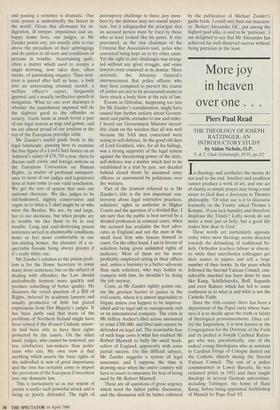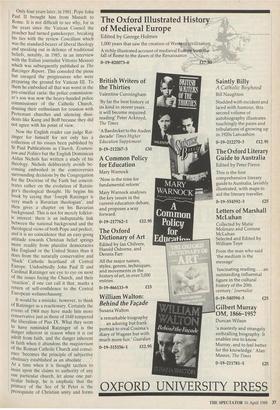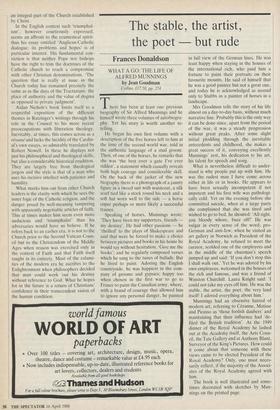More joy in heaven over one . .
Piers Paul Read
THE THEOLOGY OF JOSEPH RATZINGER: AN INTRODUCTORY STUDY by Aidan Nichols, O.P.
T. & T. Clark (Edinburgh), f9.95, pp.352
In theology and aesthetics the means do not lead to the end. Intellect and erudition cannot produce a work of art, and one act of charity or simple prayer may bring a soul closer to God than a doctorate in Thomist philosophy. 'Of what use is it to discourse learnedly on the Trinity' asked Thomas a Kempis, 'if you lack humility and therefore displease the Trinity? Lofty words do not make a man just or holy: but a good life makes him dear to God.'
These words are particularly apposite today when most theology seems directed towards the debunking of traditional be- liefs. Orthodox teachers labour in obscur- ity while their unorthodox colleagues get their names in papers and sell a large number of their books. In the years which followed the Second Vatican Council, con- siderable mischief has been done by men like Kung, Schillebeeckx, Boff, Segundo and even Rahner which has led to some confusion as to what is and what is not the Catholic Faith.
Since the 16th century there has been a department of the Papal curia whose busi- ness it is to decide upon the truth or falsity of theological pronouncements. Once cal- led the Inquisition, it is now known as the Congregation for the Doctrine of the Faith and its prefect is Joseph Cardinal Ratzin- ger who was, paradoxically, one of the radical young theologians who as assistant to Cardinal Frings of Cologne dusted out the Catholic church during the Second Vatican Council. The son of a police commissioner in Lower Bavaria, he was ordained priest in 1951 and then taught theology in several German universities, including Tubingen, the home of Hans Kung, before being appointed Archbishop of Munich by Pope Paul VI.
Only four years later, in 1981, Pope John Paul II brought him from Munich to Rome. It is not difficult to see why, for in the years since the Vatican Council the poacher had turned gamekeeper, breaking his ties with the review Concilium which was the standard-bearer of liberal theology and speaking out in defence of traditional beliefs, notably, in 1985, in an interview with the Italian journalist Vittorio Messori which was subsequently published as The Ratzinger Report. This consoled the pious but enraged the progressives who were preparing the ground for Vatican III. To them he embodied all that was worst in the pre-conciliar curia: the police commission- er's son was now the heavy-handed police commissioner of the Catholic Church, dousing their enthusiasm for reunion with Protestant churches and silencing dissi- dents like Kung and Boff because they did not agree with his point of view.
Now the English reader can judge Rat- zinger for himself for not only has a collection of his essays been published by St Paul Publications as Church, Ecumen- ism and Politics but the English Dominican Aidan Nichols has written a study of his theology. Nichols deliberately avoids be- coming embroiled in the controversies surrounding decisions by the Congregation for the Doctrine of the Faith but concen- trates rather on the evolution of Ratzin- ger's theological thought. He begins his book by saying that 'Joseph Ratzinger is very much a Bavarian theologian', and then gives a chapter on his Bavarian background. This is not for merely folklor- ic interest: there is an indisputable link between the national background and the theological views of both Pope and prefect, and it is no coincidence that an easy-going attitude towards Christian belief springs more readily from pluralist democracies like England or the United States than it does from the naturally conservative and `black' Catholic heartland of Central Europe. Undoubtedly John Paul II and Cardinal Ratzinger see eye to eye on most of the issues facing the Church, and their `reaction', if one can call it that, marks a return of self-confidence to the Central European weltanschauung.
It would be a mistake, however, to think of Ratzinger as a reactionary. Certainly the events of 1968 may have made him more conservative just as those of 1848 tempered the liberalism of Pius IX. What they seem to have reminded Ratzinger of is the danger inherent in reason when it is cut adrift from faith, and the danger inherent in faith when it abandons the magisterium of the Roman Catholic Church and consci- ence 'becomes the principle of subjective obstinacy established as an absolute . . At a time when it is thought tactless to insist upon the claims to authority of any one particular church, let alone one par- ticular bishop, he is emphatic that the Primacy of the See of St Peter is the prerequisite of Christian unity and forms
an integral part of the Church established by Christ.
In the English context such 'triumphal- ism', however courteously expressed, seems an affront to the ecumenical spirit: thus his essay entitled 'Anglican-Catholic dialogue: its problems and hopes' is of particular interest. His fundamental con- viction is that neither Pope nor bishops have the right to trim the doctrines of the Catholic church to reach a compromise with other Christian denominations. 'The question that is really at issue in the Church today has remained precisely the same as in the days of the Tractarians: the place of authority and the value of dogma as opposed to private judgment'.
Aldan Nichols's book limits itself to a respectful exposition of the different themes in Ratzinger's writings through his role in the Council to his more recent preoccupations with liberation theology. Inevitably, at times, this comes across as a resume and lacks the lucidity of the Cardin- al's own essays, so admirably translated by Robert Nowell. In these he displays not just his philosophical and theological skills, but also a considerable historical erudition. They are largely free from theological jargon and the style is that of a man who uses his incisive intellect with patience and humility.
What marks him out from other Church leaders is the clarity with which he sees the inner logic of the Catholic religion, and the danger posed by well-meaning tampering with apparently negotiable articles of faith. This at times makes him seem even more audacious and 'triumphalist' than his adversaries would have us believe. If he refers back to an earlier era, it is not to the Church prior to the Second Vatican Coun- cil but to the Christendom of the Middle Ages when reason was exercised only in the context of Faith and that Faith itself taught in its entirety. Most of the calami- ties of the modern era he ascribes to the Enlightenment when philosophers decided that man could work out his destiny without reference to God. What he hopes for in the future is a return of Christians' confidence in their transcendent vision of the human condition.
































































 Previous page
Previous page